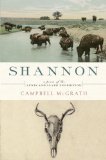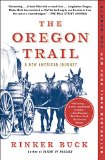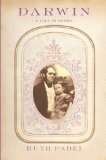Summary | Excerpt | Reviews | Read-Alikes | Genres & Themes | Author Bio

A Poem of the Lewis and Clark Expedition
by Campbell McGrathFrom the inimitable Campbell McGrath comes an epic poem of George Shannon, the youngest member of the Lewis and Clark expedition, who wandered the prairie alone for sixteen days.
The last of the Maha will fade from the earth
Vanquished utterly by the Pawnee
& after the Pawnee the Sioux may perish
& eventually the Kentuckians and Ohioans &c—
I doubt not but my countrymen
Will populate in numbers these fulsome plains
But what untold count
Of years & men, of decades & centuries
What numberless generations will it require
Life by life & skeleton by skeleton
To claim this land from the buffalo?
With Shannon, a testament to both natural splendor and human courage, Campbell McGrath has created a thrilling narrative that rises from those vast, lonely spaces that continue to haunt the American consciousness.
Books and documentaries about the Lewis and Clark Expedition have proven popular in recent years, but Campbell McGrath opens a new window onto this famous duo by focusing on one of its lesser-known figures: George Shannon, an 18-year-old expedition member who became lost from the group for sixteen days. Shannon himself kept no record of what happened during his accidental sojourn on the prairie (present-day Nebraska and South Dakota), so McGrath has free reign to re-create the young explorer's shifting emotions when confronted by the immensity of the wilderness. Implementing the perfect blend of high and low diction, McGrath captures Shannon's voice without strain or pretension in a series of free verse poems, one for each day spent wandering.
Shannon's initial annoyance at having to pursue a pair of lost horses soon turns to awe in the face of a mysterious landscape; it is likely that he was the first American settler to see this part of the country, and he experiences a corresponding sense of vertigo. Indeed, McGrath portrays Shannon as a kind of secular prophet wandering in the desert. Shannon's disdain for organized religion stems from a preacher's glib assertion that Shannon's younger brother drowned because God works in mysterious ways. Later in the narrative, Shannon grapples with how a loving God could allow a boy to die, but in poem 5, he recounts a sort of holy epiphany that he once had in Kentucky when, tapping trees for syrup, he came upon a blooming tree and "beheld the shape of the thing exactly/As a revelation/In the form of an angel…That was a true & terrible fear/& near as I ever came/Or will come to believing."
When he finally becomes delirious after days without food, he has a similar experience as he notes "the river of light widening towards sunrise/this astonishment of grass, this extravagance/animals in the darkness all around me…" In a bold break from the controlled stanzas and capitalized line openings of most of the previous poems, McGrath here visually conveys a herd of buffalo stampeding across the prairie by switching to lower case and clustering the word "buffalo" in various configurations over three pages. Shannon ends this section with the declaration "I am the buffalo god, behold my kingdom," a ringing statement that cements his connection to the land in defiantly anti-theistic tones.
Abbreviated from "Biography-in-verse" by Marnie Colton

If you liked Shannon, try these:

by Rinker Buck
Published 2016
An epic account of traveling the length of the Oregon Trail the old-fashioned way—in a covered wagon with a team of mules, an audacious journey that hasn't been attempted in a century.

by Ruth Padel
Published 2012
This remarkable book brings us an intimate and moving interpretation of the life and work of Charles Darwin, by Ruth Padel, an acclaimed British poet and a direct descendant of the famous scientist.
Life is the garment we continually alter, but which never seems to fit.
Click Here to find out who said this, as well as discovering other famous literary quotes!